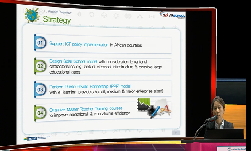University attendance includes various activities and experiences that can have a unique impact on psychosocial development and adult health behaviors, and can influence life course outcomes such as short- and long-term health and quality of life. Co...
http://chineseinput.net/에서 pinyin(병음)방식으로 중국어를 변환할 수 있습니다.
변환된 중국어를 복사하여 사용하시면 됩니다.
- 中文 을 입력하시려면 zhongwen을 입력하시고 space를누르시면됩니다.
- 北京 을 입력하시려면 beijing을 입력하시고 space를 누르시면 됩니다.
Health Status During College Students' Transition to Adulthood: Health Behaviors, Negative Experiences, and the Mediating Effects of Personal Development.
한글로보기https://www.riss.kr/link?id=T13587985
- 저자
-
발행사항
[S.l.]: Columbia University 2013
-
학위수여대학
Columbia University Sociomedical Sciences
-
수여연도
2013
-
작성언어
영어
- 주제어
-
학위
Dr.P.H.
-
페이지수
187 p.
-
지도교수/심사위원
Advisers: Robert Fullilove; Angela Aidala.
-
0
상세조회 -
0
다운로드
부가정보
다국어 초록 (Multilingual Abstract)
University attendance includes various activities and experiences that can have a unique impact on psychosocial development and adult health behaviors, and can influence life course outcomes such as short- and long-term health and quality of life. College attendance and health are cyclical and reinforcing factors. Healthier students do better while at college, which allows them to effectively progress through university. College graduation is closely associated with improved health status in later life. In addition, students' personal development as part of their transition to adulthood during college, which includes psychosocial and interpersonal growth, is associated with greater gains in health and personal success in later life. Identifying the factors associated with enhanced health status while in college would ensure that a greater number of the overall population has access to the potential health benefits of progressing through and graduating from an institution of higher education. Because health behaviors can have a significant impact on how well a student progresses through college, as well as future quality of life, colleges and universities should recognize the role health is playing in the student experience.
This study explored the connection of how factors such as student sub-group participation, health behaviors, and particular negative experiences affect the health status of college students attending a large, urban, top-tier university. It investigated which students were at an increased risk for negative mental health symptoms and overall lower general health and how students' participation in various groups (student athletes, students who are members of sororities and fraternities, and students who volunteer) is associated with health behavior (alcohol and other drug use, sexual behavior, and sleep), negative experiences (bias/discrimination and interpersonal violence), and health outcomes. In addition, the study analyzed how personal development at college mediates those relationships. This study is based on non-experimental cross-sectional survey data from the National College Health Assessment that was collected in collaboration with the American College Health Association at Columbia University (CU). All enrolled undergraduate students at CU in Columbia College or the School of Engineering and Applied Sciences in the spring semester of 2009 (n=5708) were invited to participate in the survey, and 31.8% of the sample responded. This research used the Baron and Kenny model to examine the mediation effects of personal development on general health and mental health via a series of bivariate and regression analyses.
While the overall general and mental health of respondents was good, particular groups were less likely to report overall excellent or very good general health and more likely to report mental health symptoms. Negative experiences and health behaviors varied significantly between student sub-groups. Health behaviors and negative experiences were predictive of overall general health and mental health symptoms. Sleep, drug use, and experiences of bias/discrimination and interpersonal violence (IPV) were most predictive of health. Personal development was found to partially mediate the relationship between IPV, sleep and overall general health. In addition, personal development was found to partially mediate the relationship between IPV, drug use other than or in addition to marijuana, and sleep and mental health symptoms. The findings from this study suggest that college and university administrators should consider directing resources into targeting particular groups of students for focused health promotion interventions related to specific topics as a method for improving overall general health and reducing mental health symptoms of students. College and university administrators are encouraged to consider the role of personal development as a unique factor in improving student health.
분석정보
연관 공개강의(KOCW)
-

Education Policy at the Party Conferences
Teachers TV Teachers TV -

Psychology of Adolescence
이화여자대학교 유성경 -

2014 이러닝 국제 콘퍼런스 : What is the Lessons from Education Support Project~
한국교육정보진흥협회 Boseon, Kim -

Early Sex Education: The Debate
Teachers TV Teachers TV -

Further Education: Work Experience
Teachers TV Teachers TV






